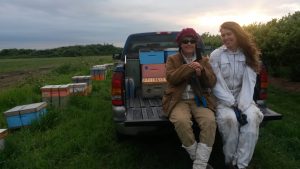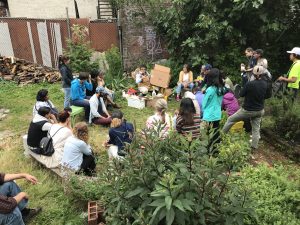2.7: Julia Common- Apiculture to Community Culture
- Page ID
- 29085

“The first time I put my hands in a hive I loved it,” says Julia Common of Hives for Humanity. Julia started beekeeping as a hobby at age 21, traveling with this hobby to England and Scotland. In 2012, when her daughter asked her to bring bees to the city of Vancouver, British Columbia, Canada, Julia became the Chief Beekeeper for Hives for Humanity, a 200 colony operation. Hives for Humanity is a non-profit organization providing mentorship-based programming for people to engage in therapeutic culture that surrounds the hive. In her daughter’s community in East Vancouver, there are houseless folks and people living with addictions. The organization’s core work is to use beekeeping as a therapeutic activity for these populations.
Julia started with two hives given to her by a researcher from Winnipeg, Manitoba, Canada and from there began her journey to learn beekeeping. By the time she started Hives for Humanity, she went from one hive to 75 to 150 to 250 to the current number of 200 full colonies and 75 nucs.
Her daughter Sarah who had been working with marginalized populations in the Downtown Eastside of Vancouver doing gardening work thought that beekeeping could provide places of respite for these populations. The introduction of the bees was well received. This area is fraught with drug addiction, homelessness, and unemployment but the community is strong. Sarah engages the community in beekeeping, gardening, candle making, and honey extraction. “They do all sorts of jobs to support the bees,” says Julia.
Vancouver is progressive with bees; pollinating corridors and parks abound and neonicotinoids are banned for use on plants. Vancouver’s winter is much milder and their growing season is longer. “Urban beekeeping is sweet because the bees have plenty to eat all the time,” says Julia. But, “the biggest challenge is that you do not want people to interfere with the bees.” So far, they’ve been lucky with minimal instances of people disturbing the bees.

“Working for Hives for Humanity has changed how I do everything,” says Julia. “Everything that is happening to people is happening to the bees” – lack of nutrition, nowhere to live, chaos. Since moving from beekeeping as a hobby to a community service, Julia has focused on the parallels between human nature and bees, a connection she may not have made if she stayed in the country with her bees.
“Moving them around, making splits when they are not strong enough, over treating them, exposing them to monocultures where they get poor diet, and chemical exposure and miticides” – these are all problems she identifies in modern beekeeping but with the advantages of the climate in Vancouver mentioned above, Hives for Humanity is well poised to address them.
The community has enjoyed doing extraction and found satisfaction in tasting the honey from their bees and making salves or rolling candles in the winter. “Whenever I am with people I want them to have positive experiences with bees,” says Julia.
Hives for Humanity’s work of gardening, beekeeping and fostering connection to land and community, takes place on the unceded lands of the Musqueam, Tsleil-Waututh and Squamish Nations of the Coast Salish peoples.
Media Attributions
- Julia and Sarah Common © Julia Common is licensed under a All Rights Reserved license
- Hives for Humanity bee education © Julia Common is licensed under a All Rights Reserved license


